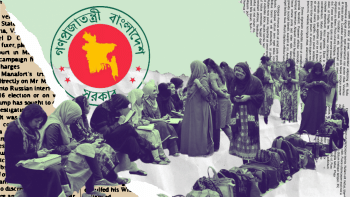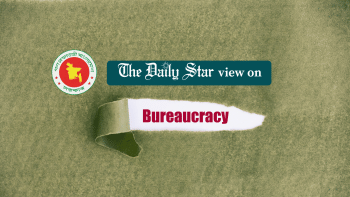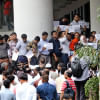Civil service unrest over reform proposals is unacceptable

We are concerned about the escalating tensions among various cadres of the Bangladesh Civil Service (BCS) following the disclosure of some draft proposals by the Public Administration Reform Commission. On Tuesday, officers from 25 BCS cadres, excluding the administrative cadre, staged an hourlong pen-down strike as part of a series of protests announced earlier. On Monday, an association for the health cadre held a press conference separately. And on Sunday, another association representing the admin cadre held an "unprecedented showdown" where hundreds of officers demonstrated outside the Secretariat. These platforms have their objections about the proposals as well as scores to settle among themselves.
Which means that the reform commission, formed to guide efforts to streamline public services and establish discipline within the administration, finds itself entangled in disputes even before submitting its recommendations to the government. Despite assurances that no proposal would be finalised without consultations with key stakeholders, unrest continues, deepening divisions among the cadres and disrupting the various sectors they represent. But why the premature agitation, and why in ways that are undoubtedly unbecoming for civil servants?
If disgruntled officers felt the need to voice their concerns before formal discussions, there are mechanisms to do so without disrupting daily operations. They could have followed institutional procedures to raise these concerns in an orderly manner. Instead, their reactions—through public meetings, demonstrations, work abstentions, and threats of tougher measures—not only violate conduct rules for government employees but also undermine the very reforms being sought through this exercise.
Various cadre groups reacted to the commission's draft proposals—including introducing exams for promotions to deputy secretary and joint secretary positions, ensuring a 50:50 ratio between admin and non-admin cadres for deputy secretary promotions, and separating health and education services from cadre structures—for various reasons. For example, the promotion ratio currently stands at 75:25 in favour of admin cadre officials, who now want full control. On the other hand, officers from the 25 cadres are demanding competitive exams for promotions to deputy secretary and higher positions, which they believe should be quota-free. There were already pre-existing tensions over perks and promotions among various cadre groups. The present controversy has again brought these inter-cadre disputes to the fore.
That the reform commission is being forced to deal with such parochial issues, rather than enhancing public service, highlights the difficulty of escaping the shadow of Awami League's misrule that vitiated the administrative environment. Fifteen years of partisanship, corruption, and nepotism transformed the administration into an extractive and exploitative structure, and its disruptive effects are still being felt. We must say that we had expected the interim government to be more resolute and judicious in overhauling this structure, particularly in terms of establishing discipline, which it has failed to do. The extent to which this controversy was allowed to fester is thus a failure on the part of both the protesting officers and the higher authorities.
That said, the officers must take responsibility for their disruptive activities. It is unacceptable that vested interests are taking precedence over public service and further weakening an already struggling administration. The government should resolve the disputes through dialogue if needed, but must not lose sight of its promises of reform in the process.


 For all latest news, follow The Daily Star's Google News channel.
For all latest news, follow The Daily Star's Google News channel. 











Comments